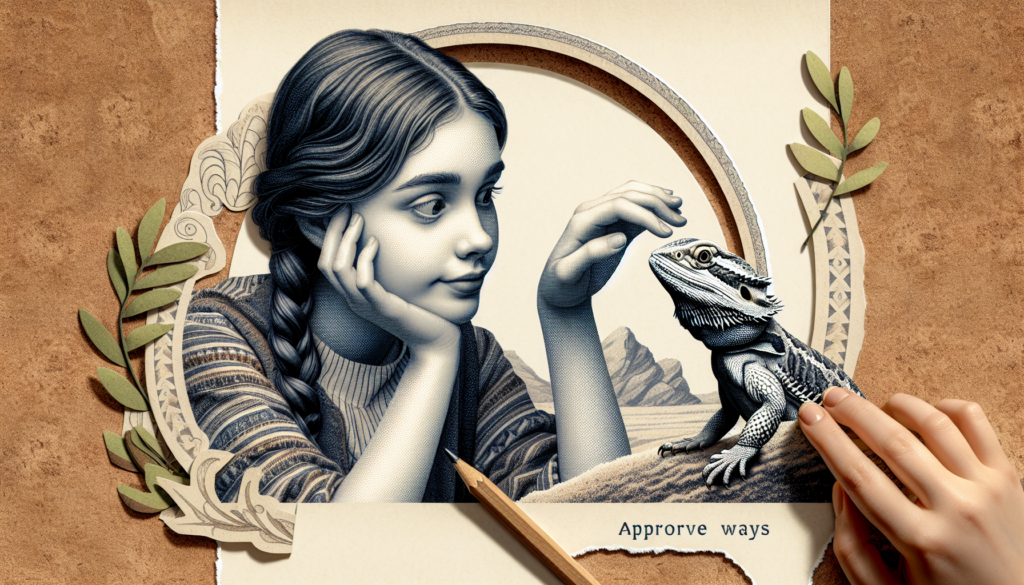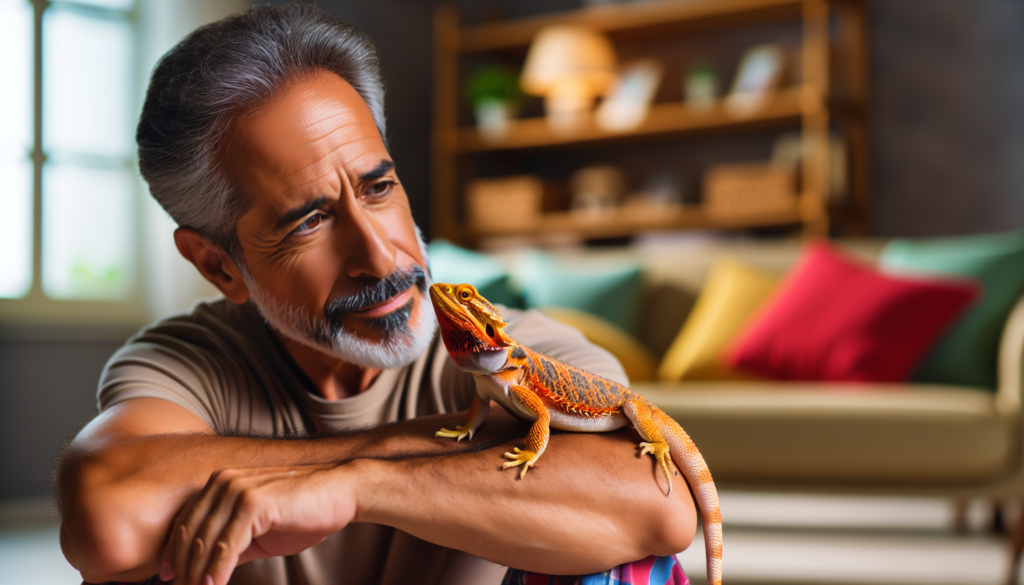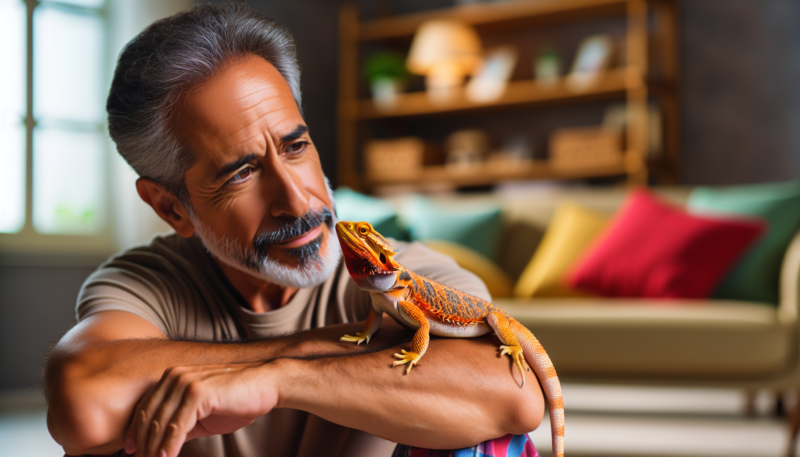Have you ever wondered if it’s okay to give your beloved bearded dragon a kiss? In this article, we will explore the fascinating world of bearded dragons and address the question on many enthusiasts’ lips – is it safe to smooch your scaly friend? Join us as we uncover the truth about the bond between humans and these reptilian companions and discover the do’s and don’ts of showing affection to your bearded dragon. So, get ready to learn all about the dos and don’ts of smooching your scaly pet!
What is a bearded dragon?
A bearded dragon, scientifically known as Pogona, is a type of lizard that is native to the arid regions of Australia. These reptiles are commonly kept as pets due to their easy maintenance, friendly disposition, and unique appearance. Bearded dragons are named after the impressive “beard” of spiky scales they display under their chins, which they can puff up and change colors to communicate or show their emotions. With the right care and attention, they can make wonderful companions for reptile enthusiasts of all ages.
Understanding the behavior of bearded dragons
Communication and body language
Bearded dragons have a fascinating way of communicating through body language. By observing their behaviors and body postures, you can understand their mood and needs. For example, when a bearded dragon raises its body and flares its beard, it may be feeling threatened or wanting to assert dominance. On the other hand, if a bearded dragon flattens its body and darkens its color, it may be expressing submission or discomfort. It is important to pay attention to these cues to ensure the well-being of your bearded dragon and to establish a healthy and trusting bond.
Signs of stress or discomfort
As responsible pet owners, it is crucial to recognize signs of stress or discomfort in our bearded dragons. These signs may include excessive hiding, loss of appetite, aggressive behavior, or even changes in their physical appearance. Stress can have detrimental effects on their overall health, so it is essential to create a calm and comfortable environment for them. By being attentive and responsive to their needs, you can help alleviate their stress and ensure their overall well-being.
Natural instincts
Understanding the natural instincts of bearded dragons is essential for their health and happiness. In the wild, these reptiles are diurnal, meaning they are active during the daytime and rest at night. They are also opportunistic omnivores, feeding on a variety of insects, vegetables, and fruits. To provide a nurturing environment, it is important to mimic their natural habitat as closely as possible. This includes providing ample heat and UVB lighting, as well as a balanced diet consisting of both animal protein and vegetation.

Benefits of interacting with your bearded dragon
Bonding and socialization
Interacting with your bearded dragon on a regular basis can greatly contribute to the bond and trust between you and your scaly friend. These creatures are known to be social animals, and through gentle handling and positive reinforcement, they can become quite comfortable and affectionate with their human caregivers. Not only does this create a strong bond, but it also allows you to closely monitor their health and detect any irregularities early on.
Learning and enrichment
Spending time with your bearded dragon is not only beneficial for them but also for you. By observing their behaviors, you can learn more about their habits and instincts, fostering a deeper appreciation and understanding of these amazing creatures. Additionally, engaging in enrichment activities, such as supervised exploration outside of their enclosure or introducing new toys, can provide mental stimulation and prevent boredom. This interactive experience will undoubtedly bring joy and fulfillment to both you and your bearded dragon.
Stress relief
The calming and therapeutic effect of interacting with animals is well-documented, and bearded dragons are no exception. As you handle and interact with your dragon, you may find yourself experiencing a sense of tranquility and relaxation. The slow and deliberate movements of a bearded dragon can help reduce stress levels and promote mindfulness. Taking the time to connect with your scaly companion can be an excellent way to unwind after a long day and find peace in the present moment.
Considerations before kissing your bearded dragon
Peculiarities of bearded dragon mouths
While it may be tempting to show affection to your bearded dragon by giving them a kiss, it is important to understand their mouths’ peculiarities. Bearded dragons have a unique respiratory system that allows them to breathe through a small opening on the roof of their mouths, known as the glottis. This means that if you were to kiss your lizard, you could potentially introduce bacteria or foreign objects that could cause harm or discomfort. Therefore, it is advisable to find safer alternatives to express your affection.
Harmful bacteria and diseases
Another consideration when contemplating kissing your bearded dragon is the risk of harmful bacteria or diseases. Reptiles, including bearded dragons, can carry Salmonella bacteria, which may not affect them but can be transmitted to humans. Young children, the elderly, and individuals with weakened immune systems are particularly susceptible to the risks associated with Salmonella infection. It is crucial to practice good hygiene, such as thorough handwashing, after handling your bearded dragon, to minimize any potential health risks.
Risk of injury
When engaging in physical contact with your bearded dragon, it is important to be mindful of the risk of injury. Bearded dragons have sharp claws and teeth, which they may use if they feel threatened or uncomfortable. While most bearded dragons are gentle and unlikely to cause harm intentionally, accidents can still happen. To minimize the risk of injury, it is essential to handle your bearded dragon gently and with care, ensuring that both you and your scaly friend remain safe and comfortable.

Showing affection to your bearded dragon
Safe and appropriate physical contact
While it may be best to avoid kissing your bearded dragon, there are still safe and appropriate ways to show affection and physical contact. Gently stroking the back or head of your dragon with clean hands can be a comforting experience for them and help strengthen the bond between you. Remember to always approach your bearded dragon with calmness and respect their boundaries. Regular, positive physical contact will help them become more comfortable and trusting around you.
Alternative ways to express love
Expressing love and affection for your bearded dragon can go beyond physical contact. Providing them with a clean and comfortable enclosure, a variety of nutritious food, and a stimulating environment are all ways to demonstrate your care and love. Regularly spending time with your dragon, talking to them softly, and engaging in enrichment activities are also effective ways to show affection and ensure their overall well-being.
Reading your bearded dragon’s reactions
Every bearded dragon is unique, and it is crucial to pay attention to their individual reactions and preferences. While some may enjoy being gently stroked or held, others may prefer simply sitting with you or exploring their surroundings under your watchful eye. By closely observing their body language, you can gauge their comfort level and adjust your interactions accordingly. Remember that mutual trust and understanding are key to nurturing a strong and healthy relationship with your bearded dragon.
Educating yourself about bearded dragon health
Regular vet check-ups
To ensure the optimal health of your bearded dragon, regular veterinary check-ups are highly recommended. A reptile specialist will be able to assess your dragon’s overall well-being, provide guidance on nutrition and enclosure setup, and address any health concerns that may arise. Regular check-ups allow for early detection and treatment of potential ailments, promoting a long and healthy life for your scaly companion.
Proper hygiene and cleaning
Maintaining proper hygiene and cleanliness in your bearded dragon’s enclosure is crucial for their health. Regularly cleaning and disinfecting their enclosure, including removing waste and replacing substrate, prevents the buildup of harmful bacteria and reduces the risk of infections. Additionally, providing a clean source of water and washing your hands before and after handling your dragon minimizes the spread of potential pathogens.
Common health issues to watch for
Being knowledgeable about common health issues that bearded dragons may face is essential in providing them with the best possible care. Some common ailments include respiratory infections, metabolic bone disease, parasitic infestations, and digestive issues. Being proactive by monitoring their eating habits, watching for changes in behavior, and seeking veterinary care at the first sign of illness can greatly improve their chances of a full recovery.
Creating a comfortable environment for your bearded dragon
Temperature and lighting requirements
Creating the ideal environment for your bearded dragon is crucial for their overall health and well-being. Bearded dragons require specific temperature and lighting conditions to thrive. Providing a basking spot with a temperature of around 100-110°F (37-43°C) and a cooler side of the enclosure around 80°F (27°C) allows your dragon to regulate its body temperature effectively. Additionally, full-spectrum UVB lighting is necessary for Vitamin D synthesis and calcium absorption. By carefully monitoring and adjusting these conditions, you can ensure a comfortable and happy habitat for your bearded dragon.
Appropriate enclosure and substrate
Choosing an appropriate enclosure and substrate is vital for the comfort and safety of your bearded dragon. The enclosure should be spacious enough to allow for adequate movement and have secure ventilation to maintain proper airflow. As for the substrate, it is important to avoid loose substrates that can be ingested and cause digestive issues. Options such as reptile carpet or non-adhesive shelf liner are safe alternatives. Regularly cleaning and disinfecting the enclosure will help maintain its cleanliness and prevent the growth of harmful bacteria.
Providing a balanced diet
A balanced diet is essential to meet the nutritional needs of your bearded dragon. A combination of animal protein, such as crickets, mealworms, or dubia roaches, and a variety of vegetables and fruits should be offered. Leafy greens such as collard greens or dandelion greens, as well as squash, bell peppers, and berries, are all great options. Ensuring proper calcium and vitamin supplementation is also important to prevent metabolic bone disease. Consulting with a reptile veterinarian or a specialist in bearded dragons can help tailor a diet plan specific to your dragon’s needs.
Dangers and precautions to be aware of
Toxic plants and harmful substances
It is crucial to be aware of toxic plants and substances that could pose a threat to your bearded dragon. Certain plants, such as ivy, lilies, or daffodils, can be toxic if ingested and should be avoided in their enclosure. Additionally, household chemicals, cleaning products, and pesticides should be kept away from your bearded dragon’s living space to prevent accidental exposure. Always research and double-check the safety of any new plant or substance before introducing it into your dragon’s environment.
Other pets and potential conflicts
If you have other pets in your household, it is important to introduce them to your bearded dragon gradually and under close supervision. Larger animals, such as dogs or cats, may view your dragon as prey, while smaller pets, like rodents or birds, may be seen as potential threats. It is essential to prioritize the safety and well-being of all animals involved, ensuring that interactions are positive and stress-free. Never leave your bearded dragon unattended with other pets until you are confident in their ability to coexist peacefully.
Supervision and avoiding accidents
Bearded dragons are curious creatures and can sometimes get themselves into sticky situations. It is crucial to supervise them closely when they are outside of their enclosure to prevent accidents or injuries. Ensure that the area is secure and free from potential hazards or escape routes. Preventing falls, injuries from household objects, and accidental ingestion of foreign objects is vital for their safety. Always prioritize the well-being of your bearded dragon and provide careful monitoring during their exploration time.
Consulting a reptile specialist
Seeking professional advice
If you are considering getting a bearded dragon or are already a proud owner, seeking professional advice from a reptile specialist is highly recommended. These experts have in-depth knowledge and experience in caring for bearded dragons and can provide tailored guidance specific to your dragon’s needs. They can answer questions, address concerns, and provide valuable resources to ensure you provide the best care and environment for your scaly companion.
Understanding specific needs
Each bearded dragon is unique, with its own set of preferences and needs. A reptile specialist can help you understand the specific requirements of your dragon, from enclosure setup and temperature regulation to diet and health concerns. By gaining a deeper understanding of your dragon’s individuality, you can provide targeted care that aligns with their well-being and happiness.
Resources for further information
If you want to expand your knowledge about bearded dragons further, there are numerous resources available that can provide valuable information and insights. Reputable books, online forums, and dedicated websites from reputable reptile organizations can offer a wealth of knowledge and advice. Always ensure that the information comes from credible sources to ensure the accuracy and reliability of the content.
Conclusion
Bearded dragons are fascinating creatures that make excellent pets for reptile enthusiasts. Understanding their behavior, needs, and health considerations is essential for providing them with a comfortable and enriching environment. While it may be tempting to show affection in certain ways, it is important to prioritize their safety and well-being. By following proper care guidelines, seeking professional advice, and respecting their individuality, you can enjoy a long and rewarding relationship with your bearded dragon. So, go ahead and create a loving and stimulating environment for your scaly friend and watch your bond grow stronger every day.
